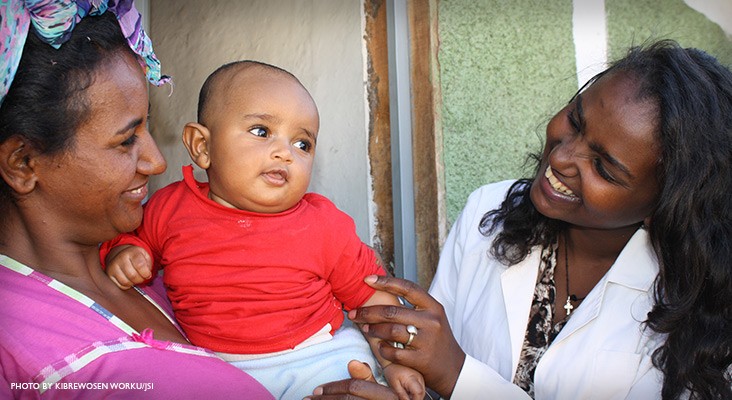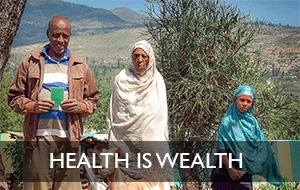Ethiopia
- History
- Our Work
- Foreign Assistance Data
- Dollars to Results
- PARTNERS
- Newsroom
- Fact Sheets
- WORK WITH US
Speeches Shim

Ethiopia has overcome many challenges to achieve some major health improvements over the past decade. However, ensuring access to good quality healthcare for over 104 million Ethiopians remains a challenge, where infectious diseases, a lack of safe water, sanitation and hygiene, and malnutrition continue to threaten the gains made in improving health outcomes.
This is why USAID partners with Ethiopia to strengthen the capacity of doctors, care providers, and community extension workers across the national health system to improve the quality of care. We focus on enhancing policy and financing to help expand access to more efficient and equitable health services with a focus on poor communities. USAID also seeks to empower communities to take ownership and action over their health and nutrition, and drive a cycle of accountable and responsive healthcare.
Through USAID, the United States is committed to reducing the transmission of diseases, promoting health as a basic right, saving lives, and working together with Ethiopia to help families achieve a healthier and more prosperous future for themselves. The U.S. Government is the largest donor in health in Ethiopia, where over the past 20 years, the United States’ long-term investments amount to more than $13 billion in total assistance—with nearly $4 billion in health alone—highlighting the American people’s long-standing partnership with the Ethiopian people. This has contributed to significant reductions in maternal and child mortality—which have declined by 50 percent and 66 percent respectively since 1990—as well as declines in diseases like malaria, TB, and HIV/AIDS.
OUR PROGRAMS
FAMILY HEALTH: To improve the quality of health services for families, particularly in underserved areas or those affected by drought, conflict and disease outbreaks, USAID invests in high impact interventions to achieve results. These include building the capacity of healthcare workers to deliver quality services, harnessing the power of digital data and information systems, and engaging communities more effectively in their own health. Our partnership with Ethiopia has also established affordable community-based health insurance for families, enabling them to seek care and withstand emergencies while reducing out-of-pocket expenses. The continuum of care ranges from maternal and newborn health to child and adolescent health services, including counseling on voluntary family planning, nutrition, and sanitation and hygiene in the household. As a result, families and communities are more resilient.
Read more about family planning and maternal and child health programs in Ethiopia
HEALTH SYSTEMS STRENGTHENING: USAID supports the Government of Ethiopia to build its capacity and commitment to developing the health sector. It also supports increased private sector investment in order to achieve financial protection, access to equitable, quality health services, and resilience in the face of shocks. We specifically work on improving commodity security, especially for essential drugs, expanding health care financing to reduce the burden on families, improving human resource capacity for health, fostering improved digital health information systems, and supporting health system policies, planning and governance with citizen engagement.
Read more about health systems strengthening programs in Ethiopia
HIV/AIDS: An estimated 660,000 people in Ethiopia live with HIV. Under the President’s Emergency Plan for AIDS Relief (PEPFAR), USAID programs ensure that those who are living with HIV know their status with access to testing, and receive treatment to suppress the virus to a level that improves their quality of life and prevents onward transmission.
Read more about HIV/AIDS programs in Ethiopia
MALARIA: Through the concerted efforts of the President’s Malaria Initiative, USAID partners with Ethiopia’s National Malaria Elimination Program to improve malaria prevention and treatment activities with an aim to substantially decrease malaria morbidity, towards the long-term goal of elimination. Ethiopia is shrinking the malaria map by targeting and expanding malaria elimination woredas (districts) through surveillance and timely response.
Read more about malaria programs in Ethiopia
NUTRITION: USAID improves the nutritional status of targeted communities through a multi-sectoral lens that includes both clinical support and market diversification approaches. This includes improving the quality of health services for pregnant and lactating mothers and for children, raising awareness of optimal nutrition practices, developing the capacity of health extension workers, supporting community-based management of acute malnutrition, and helping promote consumption of a healthy diet.
Read more about nutrition programs in Ethiopia
TUBERCULOSIS: Tuberculosis (TB), including multidrug resistant tuberculosis (MDR-TB) is one of the preventable diseases that remains a heavy burden in Ethiopia. USAID seeks to reduce the number of people with the disease and who die from it, and to eventually eliminate the disease from the country. The U.S. Government invests in improving prevention, detection and diagnostic capacity, and in improved care and treatment services.
Read more about TB programs in Ethiopia
WATER, SANITATION, AND HYGIENE: Nearly half of all Ethiopians get their daily water from unclean water sources, and only 15 percent have access to improved toilet facilities. Our water, sanitation and hygiene (WASH) activities help ensure that more people have access to clean and safe drinking water, sanitation products and services, and encourages people to wash their hands with soap, safely dispose of excreta, and exercise proper food hygiene and safe water storage at home.
Read more about WASH programs in Ethiopia
EMERGENCY HEALTH: In times of emergencies—such as drought,conflict, or disease outbreak when people do not have enough to eat or access to water—we help make sure that families have access to food and health services, and that communities have access to clean safe water. We also support the Global Health Security Agenda to improve Ethiopia’s capacity to prevent, detect, and respond to infectious diseases that can jump from animals and insects to humans, including support to Ethiopia’s COVID-19 pandemic response.
Read more about emergency health response programs in Ethiopia
KEY RESOURCES
News
RELATED PHOTOS



Comment
Make a general inquiry or suggest an improvement.